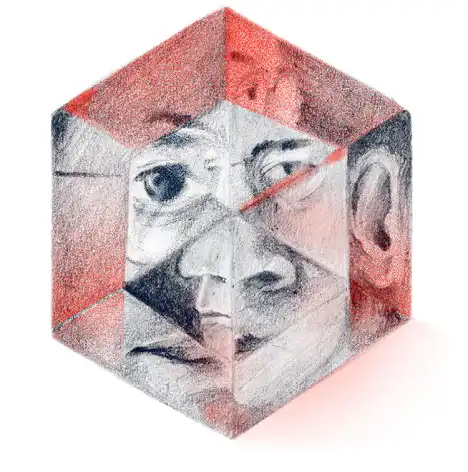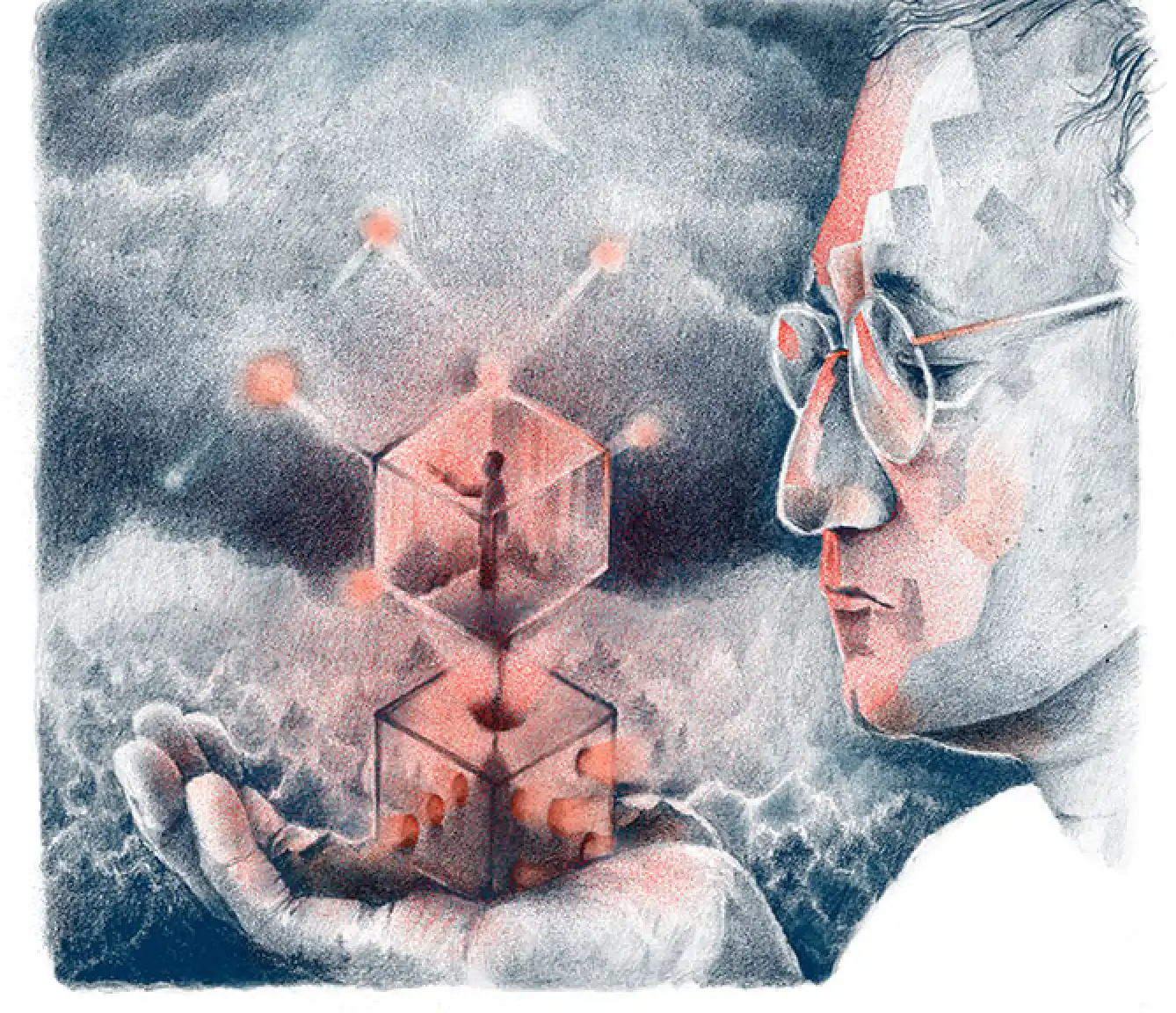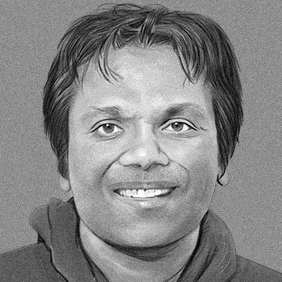As I sat across from Dhiraj, I couldn’t help but wonder about the duality of his public persona. To some, he’s an enigma—edgy, even a bit restless (a lot, at times). To others, he’s disarmingly simple and brutally honest. It’s a duality that doesn’t escape him, yet he seems largely indifferent.
Depending on the person you’re asking, the replies to the question, “What do you think of Dhiraj?, can get you extreme responses. I’ve heard and felt all kinds of sentiments ranging from, “he’s a monk” to “Dhiraj is toxic,” “selfish,” “a brilliant mind”, even undependable to being someone who never leaves his friends behind, and so on.


From ‘Ijaazat’ to ‘Izzat’
Dhiraj’s journey from ‘Ijaazat’ to ‘Izzat,’ from seeking permission to earning respect, has been transformative. But even as he’s moved from seeking external validation to self-respect, one could feel shades of vulnerability. I catch a glimpse of it every so often—a subtle yearning to affirm that he’s on the right path. It’s a vulnerability that doesn’t weaken him but humanises him. Perhaps this makes his story a deeply personal journey of self-discovery and acceptance.
Mu Seeking Sigma: The Quest for Meaning in Data
“Dhiraj, take me back to the beginning,” I said, eager to understand the roots of MuSigma he had built.
He leaned back, his eyes narrowing as if scanning his memory.
“Well, it all started with a paper,” he began.
A research paper on ‘Glonovation’ that Dhiraj had written became the blueprint for Mu Sigma. It was a term he coined, a blend of ‘global’ and ‘innovation,’ capturing the essence of what he wanted to achieve—innovation at a global scale. According to a 2007 article by Live Mint, this paper was more than just academic musings; it was a business plan in disguise.
“In those days, analytics was still a nascent field. People didn’t understand its potential,” Dhiraj recalled. “I had to convince investors, clients, even myself sometimes, that this was the future.”
Much before Mu Sigma became a unicorn, it was just an idea. At that time, Dhiraj was a consultant at Booz Allen Hamilton, deep in the world of data analytics and decision sciences. But something was missing. The industry was fragmented, and Dhiraj saw a gap that needed to be filled.
“I was always fascinated by the idea of understanding the unknown,” Dhiraj told me.
The name ‘Mu Sigma’ itself underscores his quest for understanding the unknown. “Mu seeking Sigma,” he explained, “is about the pursuit of meaning in a world drowning in data.”
The early days were fraught with challenges. Funding was scarce, and the 2008 financial crisis didn’t help. But as Business Today reported in 2012, Dhiraj secured $30 million in funding from FTVentures despite the economic downturn. It was a testament to his conviction and Mu Sigma’s promise.
“We were bootstrapped for the longest time,” he said, a hint of pride in his voice. “We had to be frugal, innovative, and resilient.”
The company started with a handful of clients but quickly expanded its portfolio. Dhiraj was selling a new way of thinking and decision-making approach. And the market was hungry for it.
“Those early clients were more than just revenue streams; they were believers in what we were trying to do,” he emphasized.

The Making of a Maverick
“I’m a lower-middle-class boy,” Dhiraj began. “Grew up with my grandparents. My grandfather was a typist in the Times of India, a man of one job he held for nearly six decades.”
As we started the conversation, I said, Dhiraj, you’re among the craziest people I’ve met in my career.
“I don’t consider myself crazy, despite what some might say. Growing up in Chembur, Bombay, I was surrounded by the vibrancy of Ganesh Chaturthi celebrations, the chants of ‘Ganapati bappa moriya’ echoing through the streets.”
But not all was festive and bright. Dhiraj’s father battled alcoholism and bipolar disorder, struggles that the family, unversed in mental health, grappled with.
“My Tata (his grandfather),” Dhiraj continued, “was the pillar that held us up through those tumultuous times.”
His grandmother’s unwavering belief in him, the conviction that he was destined for greatness, instilled an early confidence. “She didn’t know the ‘how’ or the ‘what,’ but she knew the ‘will’ was there,” Dhiraj reflected.

The Struggles: Scars as Lessons
The conversation took a somber turn as Dhiraj and I dived deeper into the dark side of entrepreneurship and life.
“Every scar is a lesson learned,” he said, his eyes reflecting a depth of experience that only comes from enduring hardships
He opened up about his separation from his wife, Ambiga Subramanian, a chapter he rarely discusses. “It’s a part of me, a part that has taught me much about what really matters,” he said. The pain in his voice was palpable, but so was the wisdom that came from it. “You know, suffering is beautiful,” he added, “it’s the sun and water for the growth of the plants of clarity.”
In Dhiraj’s life, the threads of personal and professional are tightly woven, each influencing the other. His relationship with Ambiga, his childhood sweetheart and later his wife, was one such thread that colored both the canvas of his life and the startup they built together. Their meeting was serendipitous, a collegiate encounter that blossomed into a partnership defining a significant part of their lives. “We shared the same rank in our class, she from the top and me from the bottom,” Dhiraj reminisces with a smile.
Yet, their story took a turn neither could have predicted. The unraveling of their marriage was not just a private ordeal but an event that threatened the foundations of Mu Sigma. Dhiraj’s voice grows somber as he recounts, “My ownership was reduced even further, and that put a lot of stress on the company, and I could feel that.”
The separation, while deeply painful, was handled with somewhat grace that belied the complexity of their intertwined lives. Dhiraj’s respect for Ambiga is palpable as he acknowledges her role in the resolution, “I’m very thankful to Ambiga because, despite all of the problems, she allowed me to keep the company and compensate her with cash.” It was a gesture that saved Mu Sigma, an act that ensured the company’s survival.
But his struggles weren’t confined to his personal life. Dhiraj faced a period where he was ousted from his own company, which he describes as “the dark night of the soul.”
“The board played games, investors had their own agenda, and there I was, fighting to reclaim what I had built,” he said. It was a battle that took a toll on his mental health. “I was on the brink, but I realized that if I don’t fight for it, who will?”

The subsequent lawsuit that embroiled Dhiraj and Mu Sigma was a public spectacle, a drawn-out battle that drained him financially and emotionally. “For the next 7 years, I spent more than $30 million fighting that lawsuit,” he reveals, the weight of those years still evident in his tone. The ordeal plunged him into a depression, a darkness that enveloped him, making even the act of coming to work a herculean task.
But in that darkness, Dhiraj found a transformative power.
“You have to break down; I think all things break down. You are part of the universe, and you must break down for you to be rebuilt,” he reflects. It was during this period of introspection that he discovered Vipassana, a practice that brought him the stillness and awareness necessary to rebuild himself from the inside out.
The ideas that emerged from that period of pause are now the driving force behind Mu Sigma’s new direction. “Some of the best ideas that we are implementing right now came out of those times,” Dhiraj says, pointing to the creative energy that often follows a period of personal turmoil.
“I had to fight my own battles within, including mental depression,” he said. “But these struggles have made me who I am today.”
As I listened to Dhiraj, I couldn’t help but think about how his story is a lesson for all entrepreneurs.
The road to success is fraught with challenges, but how we face these challenges defines us.
And as Dhiraj puts it, “Are you a pain seeker? Only then you are a clarity seeker.”

The Legacy: Beyond Longevity
Dhiraj leaned in and said something that struck me deeply. “Technically, if you have so much around the building and being born as an organization, shouldn’t you have something on how to die as an organization? Why not?”
He paused, letting the weight of his words sink in. “In the center, the entrepreneur is the one who is crazy and clueless about this. He should also prepare for the organisational exit.”
In some ways, participants in an organization do that, too.
“Investors, for example, do that by always preparing for an exit; employees do that by always saying that this is part of their career,” he said. It’s a sobering thought that challenges the traditional metrics of success we so often cling to.
His words took me back to the stories of Kodak and BlackBerry—companies that had once been giants in their respective fields but had faced painful declines. Kodak, for instance, failed to adapt to the digital age and filed for bankruptcy in 2012. BlackBerry, once the go-to for secure mobile communications, lost its market to iPhones and Androids. Both companies had moments of glory but couldn’t navigate the complexities of change.
They didn’t die gracefully; they faded into irrelevance.
Harvard Business Review has often discussed the concept of ‘organizational mortality,’ emphasizing that companies, like humans, have life cycles. They are born, they grow, and eventually, they die. The key is understanding when and how to exit, ensuring that the legacy lives on, even if the organisation doesn’t.

Longevity isn’t the only measure of a company’s success; it’s also about the grace with which it exits the stage, leaving behind a legacy that stands the test of time.

VC: The Ventilator Capital
As the conversation turned towards the often murky waters of venture capital, Dhiraj was at his candid best.
“You know,” he said, leaning back, “VCs are like ventilator capital.” I chuckled, intrigued by the term. “They keep you alive but don’t necessarily make you healthy. They’re not in it for the long haul; they’re in it for the exit.”
His words reminded me of the spectacular rise and fall of WeWork. Once valued at $47 billion, the co-working giant’s valuation plummeted, leading to the ouster of its charismatic founder, Adam Neumann. While the story is complex, many fingers point towards the venture capitalists who inflated WeWork’s valuation, only to pull the rug out when things went south.
Were they responsible for the downfall? It’s a question worth pondering.
Dhiraj continued, “Investors may offer advice, but remember, you may be driven by different intentions.” He was spot on. The alignment—or misalignment—of intentions between entrepreneurs and investors can make or break a company.
Dhiraj leaned forward, his hands clasped together as if to physically gather the weight of his words. “The numbers speak for themselves,” he said, a hint of pride lacing his tone. “Mu Sigma took only about $14 million of primary capital and returned, I believe, close to $800-900 million to investors.”
I raised an eyebrow, impressed by the magnitude of the return. “Most of the capital that came in was secondary,” he said, “which meant that the business didn’t actually need that money.”
But then, why take all that money?
Dhiraj addressed it head-on.
“If I’m completely honest, it was about validation, about being in the league with the big boys. Having names like Sequoia Capital and General Atlantic associated with us… it felt good.”
There was a vulnerability in his admission, a human desire for recognition that often clashes with the more pragmatic aspects of business.
It’s a red flag for any entrepreneur. The influx of capital can be both a blessing and a curse, providing the means to scale and setting the stage for potential conflict. As Dhiraj wisely put it, “The entrepreneur is the one who is crazy and clueless about this. He should also prepare for the organisational exit.”
“I Wish…’”
In the quiet moments of reflection, when the relentless pace of entrepreneurship slows, one’s thoughts often turn to the choices made and the delicate balance between loss and love. Dhiraj Rajaram shared his “I wish…” moments, a series of introspective thoughts that read like a founder’s bucket list.
“I wish I had the wisdom to not seek so much attestation,” Dhiraj mused, a poignant acknowledgment of the yearning for validation that so often drives us. “I wish I had taken help when I was feeling lonely, and I wish I were more open about it.”
“I wish I had a better system to create exits for employees because if you give a lot of money to people in one go, their whole mind space changes quite a bit.”
But perhaps the most heartfelt admission was his wish to have spent more time with Aakash, his son. “I wish I didn’t carry so much work home, and I wish I had spent more time with Aakash.” This echoes a father’s love, a reminder that amidst the spreadsheets, pitches, and board meetings, there lies the unquantifiable value of presence, of shared moments.
Dhiraj’s lessons in hindsight can help shape a future where the founder’s bucket list becomes a blueprint for a more mindful, fulfilling journey.

Conclusion: The Signals We Need
As I left Dhiraj’s sanctuary-like home in the foothills of Nandi Hills, I couldn’t help but reflect on the signals his journey sends out to the world, especially to the buzzing startup ecosystem of Bangalore.
“Are you a pain seeker? Only then you are a clarity seeker,” he had said.
These words reverberated as I thought about his life’s brutal, unvarnished lessons.
Dhiraj’s journey is a real-life saga with its share of dragons. From being ousted from his own company to battling mental depression, he has seen it all. But what stands out is his resilience and ability to turn adversity into wisdom. “I had to fight my own battles within,” he said, “but these struggles have made me who I am today.”
His story reminds me of the brutal honesty in the book “The Hard Thing About Hard Things.” There are no easy answers in entrepreneurship. The road is fraught with challenges that can either break or make you. And as Dhiraj puts it, “You can’t borrow clarity; you have to earn it, often through suffering and struggle.”
But perhaps the most important lesson comes from his concept of “ventilator capital.” “VCs can keep you breathing but can’t give you life,” he said. “You have to find that within yourself.” It’s a lesson that many entrepreneurs learn the hard way, often after it’s too late.
“I think at some point there was a switch that had turned on in me which said that now it is not going to be about 40 under 40, it’s going to be about 80 under 80. When I am 80 years old what would I feel proud about? That’s what I was thinking and I think that clarity did help.”
As I drove back to the city, leaving behind the ancient temples and the villages surrounding Dhiraj’s home, I realised his story was a signal we all need. It’s a signal that tells us that the journey is long and the road is hard, but if you’re willing to seek pain, you’ll find clarity. And in that clarity, you’ll find your true self.
Field Notes
Over a decade ago, on a winter day in 2007, I found myself accompanying Archana Rai, my colleague at Mint Newspaper, to meet Dhiraj Rajaram, the founder of Mu Sigma. Archana described the startup as the next big thing. She insisted I come along, knowing my beat in technology might intersect with the story at Mu Sigma.
I remember my first glimpse of Dhiraj vividly. He was an enigma, unsettled and reticent, yet his eyes shined with an exuberance that belied his outward reserve. It was a paradox that intrigued me.
Years passed, and the narrative of Mu Sigma and Dhiraj took on the hues of a Shakespearean drama—full of sound and fury. We at FactorDaily wrote a piece that cast a critical eye on these turbulent times, a story that, I later learned, upset Dhiraj too. It was a journalistic endeavor, but one cannot deny the sting that truth can sometimes carry.
So, it was with a sense of strange excitement that I reconnected with Dhiraj. To my surprise, he was an open book, willing to share the chapters of his life that were lined with scars as well as trophies. It was a conversation that went beyond the usual founder narrative, going into the raw truths of an entrepreneur’s life.
Reflecting on this journey with Dhiraj, I am struck by the resilience of the human spirit. From my initial encounter with a man who seemed to be grappling with the weight of his dreams, Dhiraj’s story is a reminder of the tenacity required in entrepreneurship.
His candidness in revealing the wounds of his past, the battles fought both in the court of law and within the confines of his own mind, offered a glimpse into the cost of ambition. Yet, he could find meaning in these struggles, to transform pain into lessons of growth, that resonated with me the most.












